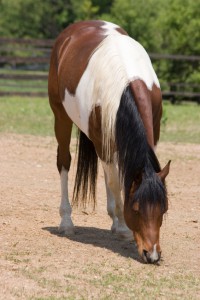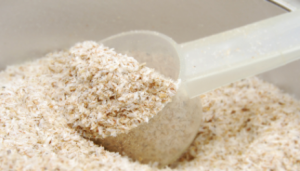 It is very uncommon for horses or ponies to intentionally eat sand. However, horses that eat hay from the ground, or graze sandy pastures especially during the summer months when grass is short, or the winter months when on wet pasture may end up with sand burdens in their digestive tracts. When sand is ingested it will usually pass through the digestive system with food and be excreted out, but its abrasive nature can irritate the intestinal lining, which may lead to loose stools, weight loss and colic. In the worst cases sand will accumulate, slowing down passage of food, and it may cause an impaction. Some horses have sand burdens without it causing a medical problem, but for lots of horses it becomes a clinical issue. How can you help to prevent Sand Burdens?
It is very uncommon for horses or ponies to intentionally eat sand. However, horses that eat hay from the ground, or graze sandy pastures especially during the summer months when grass is short, or the winter months when on wet pasture may end up with sand burdens in their digestive tracts. When sand is ingested it will usually pass through the digestive system with food and be excreted out, but its abrasive nature can irritate the intestinal lining, which may lead to loose stools, weight loss and colic. In the worst cases sand will accumulate, slowing down passage of food, and it may cause an impaction. Some horses have sand burdens without it causing a medical problem, but for lots of horses it becomes a clinical issue. How can you help to prevent Sand Burdens?
- If you need to feed hay or haylage in the field, provide it on rubber mats or concrete pads that can be easily swept to remove dirt or sand
- Try not to over-graze paddocks: ingestion of sand and soil is much higher when grass length is less than 2 inches!
- Many vets receommend the use of Psyllium husks is a well-recognised way to reduce sand burdens within the gut- these fibrous husks swell, forming a gel like mass once digested and travel through the digestive tract picking up sand and excreting it in the horses dung.
 If your horse is grazing sandy soil or you are feeding hay from the ground, regular feeding of Psyllium husks, for consecutive days every two months will help to maintain a clear digestive tract. This product should be fed dry, if necessary, layer between dry feed.
If your horse is grazing sandy soil or you are feeding hay from the ground, regular feeding of Psyllium husks, for consecutive days every two months will help to maintain a clear digestive tract. This product should be fed dry, if necessary, layer between dry feed.
Olivia Colton MSc Nutritional and Technical Coordinator, Feedmark











